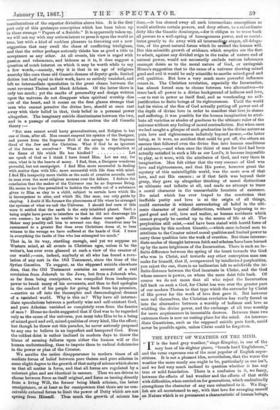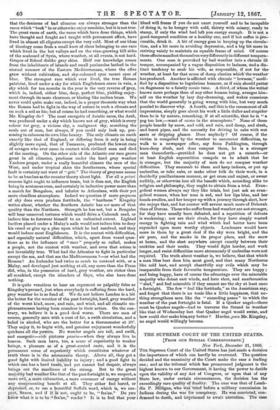THE EFFECT OF WEATHER ON THE MIND. "TT is the
hard grey weather," sings Kingsley, in one of the very best of his slighter pieces, "breeds hard Englishmen," and the verse expresses one of the most popular of English super- stitions. It is not a pleasant idea, nevertheless, that the worse the weather the more manly one ought to be, particularly as one isn't, and we feel very much inclined to question whether it has any true or solid foundation. There is a confusion in it, we fancy, between the effects of bad weather and the effects of that strife with difficulties, when carried on for generations, which undoubtedly strengthens the character of any race submitted to it. We Eng- lish are all accustomed to say, with that love for avenging oneself on Nature which is so permanent a characteristic of human beings, that the denizens of bad climates are always stronger than the races which "bask" in or otherwise enjoy sunshine, but it is not true. The great races of earth, the races which have done things, which have thought and fought and taught with permanent effect, have lived in almost all ciliates except the very cold. Most of our ideas of theology come from a small knot of clans belonging to one race which lived in the hot valleys and on the vine-growing hill sides of the seaboard of Syria, where weather, at all events, is not hard. Grapes of Eshcol dislike "grey skies. Half our knowledge comas from the inhabitants of islands and small peninsulas bathed in the eternal summer of the Eastern Mediterranean, where the olive grew without cultivation, and sky-coloured eyes meant eyes of blue. The strongest race which ever lived, the true Roman patriciat, lived under a sky for which Englishmen crave in vain, a sky which for ten months in the year is the very reverse of grey, which is, indeed, either blue, deep, perfect blue, yielding enjoy- ment through its mere clearness, or blazing like molten brass. We never could quite make out, indeed, in a proper theoretic way what the Roman had to fight in the way of nature in such a climate and on such a soil as his; but of course he had something, or what would Mr. Kingsley do ? The most energetic of Asiatic races, the Arab, was produced under a sky which knows not of grey, which is every colour but grey, a vicious sky, a malignant sky, scorching the souls out of men, but always, if you could only look up, pos- sessing in calmness its own blue beauty. The only climate on earth exactly like that of England, or differing from it only in being slightly more equal, that of Tasmania, produced the lowest race of savages who ever came in contact with civilized man and died of the meeting. On the other side of the Atlantic our race grows great in all climates, produces under the hard grey weather Yankees proper, under a really beautiful climate the men of the West, and under tropical skies the Southerners, whose special fault is certainty not want of "grit." The theory of greyness seems to be as baseless as the counter theory about light. For all a priori reasons light ought to influence brain, but it does not, the English being in acuteness even, and certainly in inductive power more than a match for Bengalees, and inferior to Athenians, with their yet more cloudless atmosphere. Indeed we question if mere greyness of sky does even produce fortitude, the " hardness " Kingsley writes about, whether the Southern Asiatic has not more of that quality than the Northern. Strength he has not, but a Bengalee will bear unmoved tortures which would drive a Calmuck mad, or induce him to forswear himself to an unlimited extent. Lighted heifers placed under a Malay's nails would not induce him to deny his creed or give up a plan upon which he had resolved, and they would induce most Englishmen. It is the contest with difficulties, and especially natural difficulties, which, apart from vexed ques- tions as to the influence of " race " properly so called, makes a people, not the contest with weather, and even that axiom is not invariably true. What had the Athenian to fight in particular except the sea, and that sea the Mediterranean ?—or what had the Roman? An Icelander had twice as much to contend with, or a Malay, and developed just nothing at all, any more than the Finns did, who, in the possession of hard, grey weather, are richer than all mankind, except the islanders of Skye, who also have done nothing.
It is quite vexatious to hear an argument so palpably false as Kingsley's pressed, just when everybody is suffering from the hard, grey weather he is so fond of. We do not believe London is a bit the better for the weather of the past fortnight, hard, grey weather of the worst kind, snow, and rain, and wind, and all climatic un- pleasantnesses having been ceaseless in their action. On the con- trary, we believe it is a good deal worse. There are men of course, generally men with a coat of fat, a swift circulation, and a belief in alcohol, who are the better for a thermometer at 20°. They enjoy it, to begin with, and genuine enjoyment wonderfully quickens all the powers. No wonder angels are tall, and swift, and energetic—vide pictures passim—when they always live in heaven. Such men have, too, a sense of superiority to weaker beings, a pleasure as of a great-coated caste, and it is the permanent sense of superiority which constitutes whatever of truth there is in the aristocratic theory. Above all, they get a good fight with limited liability to injury ; and a good fight in which one has a hard tussle, 'and yet cannot feel despair, always brings out the manliness of the strong. But to the great majority bad weather like that of the past fortnight is, we suspect, a mere evil, a mere exhaustion, a mere consumer of energy without any compensating benefit at all. They either feel bored, or depressed, or, to use a beautiful Suffolk word, which is, we sus- pect, Saxon, and if it is not, ought to be' " fra'an." Do you know what it is to be " fra'an," reader ? It is to feel that your blood will freeze if you do not exert yourself and to be incapable. of doing it, to be hungry with cold, thirsty with misery, ready to stamp, if only the wind had left you energy enough. It is not a good-tempered condition or a healthy one, and if hot coffee is pro-. curable, drink it. A bit of energy goes in keeping up the circula- tion, and a bit more in avoiding depression, and a big bit more in striving vainly to maintain an equable frame of mind. Of course- these effects manifest themselves very differently in different tempera- ments. One man is provoked by bad weather into a chronic ill temper, accompanied by a vague disposition to laziness, and a dis- tinct tendency to snub his wife, as responsible, if not for the' weather, at least for that sense of damp elastics whiclithe weather- has produced. Another is afflicted with chronic "lowness," modi- fied by a disposition to lugubrious humour, as if rain should patter- on flagstones to a faintly comic tune. A third, of whom the writer- knows more perhaps than of any other human being, avenges him- self on the weather by lazy day-dreaming, and wakes conscious- that the world generally is going wrong with him, but very much. puzzled to discover why. A fourth, and this is the commonest of all. impressions, simply goes about his work a little dullerand stupider- than he is by nature, remarking, if at all scientific, that he is "a peg too low,—want of ozone in the atmosphere." None of these people benefit by snow, and cold, and rain, and damp, and slush, and burst pipes, and the necessity for driving in cabs with wet seats or dripping glasses. Does anybody ? Of course, if the victim is compelled by the weather to encounter difficulties, to. walk to a newspaper office, say from Paddington, through knee-deep slush, and does conquer them, he is a stronger- man thenceforth—provided he does not get a catarrh—or at least English superstition compels us to admit that he is stronger, but the majority of men do not conquer weather difficulties. They succumb to them and keep indoors, or put up- umbrellas, or take cabs, or make other folk do their work, in a decidedly pusillanimous manner, or get cross and unjust, or swear audibly, or otherwise lose all the benefit which, according alike to. religion and philosophy, they ought to obtain from a trial. Evan- gelical women always say they like trials, but just ask an evan- gelical woman, when her nose is red, and her lips blue, and her- hands swollen, and her temper up with a journey through sleet, how she enjoys that, and her answer will savour much more of Deborak than of Dorcas. Those who sufferfrom bad weather are not stronger, for they have usually been defeated, and a repetition of defeats- is weakening ; nor are their rivals, for they have simply wasted. energy in fighting rain and wind which had better have been- expended upon more worthy objects. Londoners would have more in them by a great deal if the sky were bright, and the air pure, and the smoke in its proper place, and the snow at home, and the sleet anywhere except exactly between their- neckties and their necks. They would fight harder, and work longer, and resist difficulties more strenuously if umbrellas were not required. The truth about weather is, we believe, that that which a man likes best does him most good, and that many Northern& like cold best, and accept cheerfully any evils which may be- inseparable from their favourite temperature. They are happy ;• and being happy, have of course the advantage over the miserable- majority who detest east winds, and hate sleet, and anathematize "shad," and feel miserable if they cannot seethe sky at least once- a fortnight. The few "feel like fortitude," as the Americans say, and forget that there is no tonic like a little happiness, that no- thing strengthens men like the "exceeding peace" to which the- weather of the past fortnight is fatal. If a Quaker angel—there must be Quaker angels—had to traverse the Strand in weather like that of Wednesday last that Quaker angel would swear, and. how could that make hi% any better? Harder, pace Mr. Kingsley, no angel would willingly become.































 Previous page
Previous page